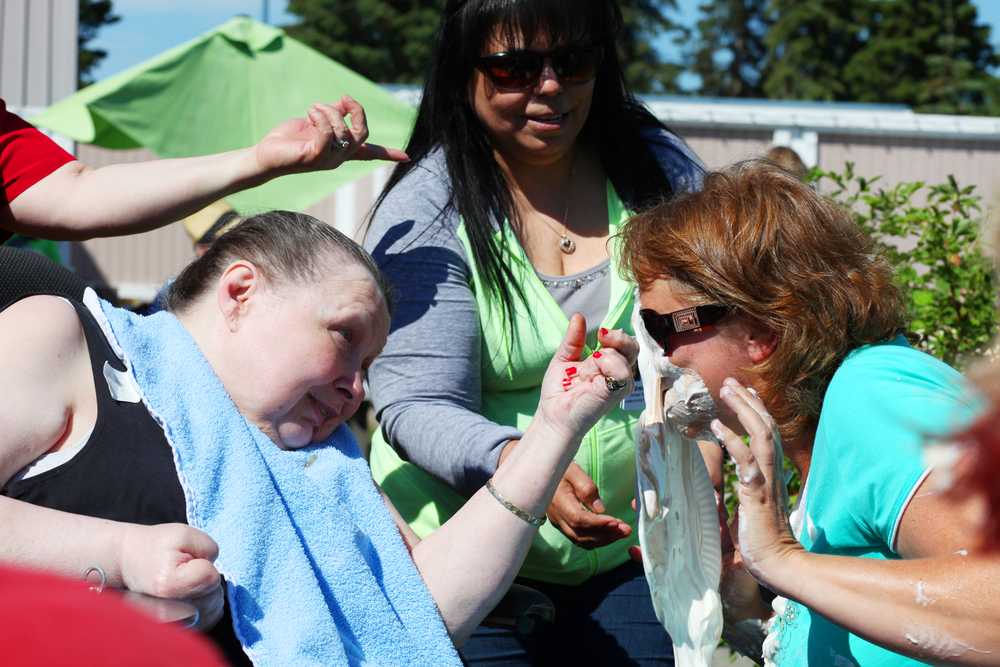For the first time in Alaska, the longest day of the year will be devoted to raising awareness for Alzheimer’s.
From sunrise to sunset on Sunday, five teams throughout the state will participate in activities for the Alzheimer’s Associations’ The Longest Day fundraiser that elicit the memories of loved ones who fought the disease, or support those who are still battling it.
The goal this year was to raise $5,000 for Alaska, said Cindy Harris, Alaska’s ambassador for the association. They exceeded their goal by Saturday. For Harris’s part, she is preparing pasta with her sister in memory of her mother Lena Berta; a full-blooded Italian with a passion for family. Harris’s team, the 907 Bellas, is scattered throughout Alaska and the Lower 48, with other family barbecuing, hiking, attending church and golfing in revival of the matriarch’s interests.
“My mother had it for 15 years”, Harris said. “(I was) seeing a very strong woman turn into a, you know, they kind of go and turn into young children almost because they forget everything.”
Harris also watched her mother’s three sisters succumb to the disease. In turn, she fears her future and that of her five older sisters.
Alzheimer’s is the sixth leading cause of death in the United States. Of the 5.3 million diagnosed Americans, with 6,400 of those living in Alaska, two-thirds are women, according to the Alzheimer Association.
“It’s a sad, degrading disease,” Harris said. “It’s scary. It’s a scary disease.”
Periodically, Harris would fly down to Colorado to care for her mother and offer some relief to her sister’s, who acted as primary caregivers.
Harris recalls her mother exhibiting common symptoms of Alzheimer’s.
“They wander a lot,” Harris said. “I would fly in and she would ask my dad ‘who is that lady? Who is that lady, is she staying here’?”
Near the end, name tags became a necessity. Harris’s mother would forget the people around her every 15 seconds. Shirts with brand names on the front would become substitute title’s for the people around her, Harris said.
Throughout it all however, Harris’s mother never forgot Harris’s father, whom she was married to for nearly 65 years.
Harris said it is imperative more annual funding goes to Alzheimer’s research. Funds collected from The Longest Day go directly to finding ways to prevent and treat the disease, which is why Harris got involved originally, she said.
Someone in the United States is diagnosed with Alzheimer’s every 67 seconds, according to the association. Less than half of seniors diagnosed with Alzheimer’s are aware of their diagnosis, or have been diagnosed at all, according to the association.
Receiving and understanding a diagnosis is essential for providing specialized care for people who have the disease, said Heritage Place of Soldotna Director of Clinical Service Sandi Crawford. Of the 50 beds at Heritage Place, 19 are filled with residents who have advanced Alzehiemer’s or dementia, she said.
Team Kenai Spine and Heritage Place nursing home’s team NeverMind are also involved in the event’s first year in Alaska. NeverMind has been hosting pie-throwing contests, a silent auction and members will take turns riding bikes from dawn to dusk Saturday, taking part in The Longest Day, one day early.
On the Kenai Peninsula, the fastest growing demographic is the population aged 50 and older, Crawford said.
Age is the highest risk factor for developing the disease, but that does not mean it is a normal part of aging, Harris said.
In the Central Kenai area, nearly 15 assisted living facilities provide residents, whose Alzeheimer’s or dementia is not advanced, with more focused care and training, Crawford said.
Heritage Place is the only facility in the Central Kenai area that provides beds for seniors with progressed Alzheimer’s and dementia, Crawford said. Alaska has 18 nursing homes statewide, which means a limited number of beds for residents who require more specialized care than can be provided elsewhere, she said.
“Eventually, the community is going to need more beds, and someone’s is going to have to figure out how to pay for them,” Crawford said.
The Kenai Peninsula Family Caregiver Support Program and the Independent Living Center of the Kenai Peninsula have resources to assist families in caring for loved ones that have the disease, said Director of
Clinical Service at Heritage Place Gwen Johnson. A handful of local doctors can help rule out reversible causes for symptoms similar to Alzheimer’s such as pain or anemia, but none who can directly diagnose the disease, she said.
Alaska Office of the Ombudsman, a federally mandated program that handles resident mistreatment cases, has asked for increased training for staff who are taking care of patients with dementia and Alzheimer’s, Johnson said.
At Heritage Place, the staffing for patients with advanced dementia is one staff member to every four residents, Crawford said. The facility is the only long-term care facility in the state that does not use anti-psychotics, restraints or alarms in response to patient behaviors, she said.
The staff has also been working with their residents at Heritage Place for a long time, Johnson said. The staffing ratios and longevity coupled with unobtrusive medical procedures allows the staff to be completely in tune with their patients, Johnson said. Resident’s physical and emotional needs are more often met this way.
“It is amazing the kind of subtleties they can pick up on,” she said.
Harris will be hosting a wrap up party from noon to 4 p.m., Monday, at Soldotna Creek Park for the teams that participated in the Central Kenai Peninsula area in The Longest Day. Harris will still take donations for the association during the event.
“You can always donate to the cause,” Harris said.
Reach Kelly Sullivan at kelly.sullivan@peninsulaclarion.com

